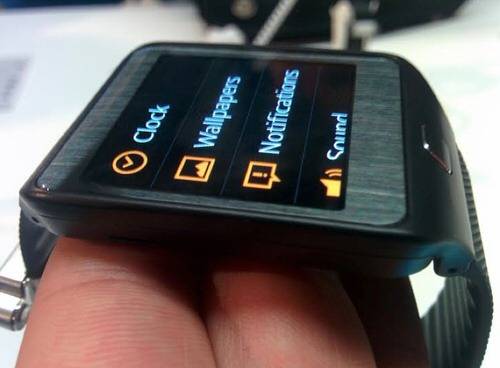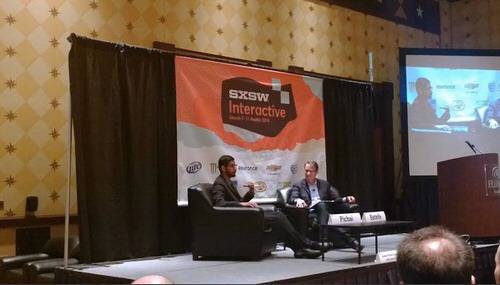Google may be commonly associated with Google Glass, one of the most striking, and perhaps strangest, wearable devices out there. But where development of new wearable technology is concerned, the fun is just beginning, a top Google executive said Sunday.
Wearable gadgets aren’t just smart versions of glasses or watches, but also anything that embeds sensors that can collect data and deliver it to devices that can then better serve their users, said Sundar Pichai, senior vice president of Chrome, Android and apps at Google. And where that broader wearables market is concerned, “we are just scratching the surface,” he said.
Pichai discussed wearables and all things Android in an on-stage interview with author and Federated Media founder John Battelle at SXSW Interactive in Austin, Texas, on Sunday.
Google’s Wearable Strategy: Everything And Then Some
It is often easy to forget that Google isn’t necessarily a hardware company. It partners with manufacturers to make smartphones and tablets under the Nexus series and also has a manufacturer build Google Glass for it. Chromebooks with Chrome OS are made by partners. When the Motorola sale to Lenovo becomes official, Google will be officially out of any part of the hardware manufacturing game.
See also: Google To Release Android Software Developer Kit For Wearables
Which means that if and when Google comes out with a smartwatch, it will be in conjunction with some type of manufacturing partner. The rumors now are pointing to a Google smartwatch in conjunction with LG to be announced at its Google I/O at the end of June. In the meantime, Google will make a play to dominate the wearable world in the same way it does the mobile world with a new software developer kit for Android to be released this month.
“In two weeks we are launching the first developer SDK for Android [wearables]. That will lay out the vision for developers in how we see this market working,” Pichai said. “When we think of wearables, we think of it as a platform. We see a world of sensors. Sensors can be small and powerful and gather a lot of information that can be useful for users. We want to build the right APIs for this world of sensors.”
Google doesn’t think of wearable gadgets as just smartwatches, fitness bands, or Google Glass, Pichai said. Any type of wearable technology, be it sensors embedded in your jacket or your shoe, is the target Google is shooting for. It is the essence of the connected self that Google wants, and it needs developers to build the applications necessary to achieve that reality.

Pichai did not say how long Google has been working on the wearable SDK, but Apigee developers Prabhat Jha and Ed Anuff figured that Google could put together a skeleton SDK (like the initial one Google released for Chromecast recently) in two weeks or a fully featured one in about six months. The question of how long Google has been working on the wearable SDK is pertinent after Samsung ditched Android for Linux-based Tizen in its new Gear 2 and Gear Fit smartwatches.
Is Google just reacting to Samsung, or has it long planned to release an SDK intended to dominate the wearable space? We will learn when the wearables SDK drops in a couple of weeks and software developers give us their impressions on its depth and capabilities.
The View From Android Central
Pichai also discussed Android at length, although his spiel on the subject hasn’t evolved much. To wit: Android is open-source and freely available to anyone and has great benefit to manufacturers and developers because of its massive scale.

“Android is one of the most open systems I’ve ever seen. What makes Android great is it’s literally designed from the ground up to be customized in a very powerful way,” Pichai said.
As with any mega company with a platform that affects millions upon millions of people, Google gets its fair share of speculation, gossip and general interest into what actually happens with Android. What does Google think of Amazon and Nokia’s use of Android? Is Android really free? What kind of stipulations does Google give its business partners? What is really the relationship between Samsung and Google like?
See also: Sure, Microsoft Could ‘Fork’ Android—But It Would Be A Huge Waste Of Time
Amid all that speculation, Pichai sat down to … reaffirm the official talking points Google has laid out for Android.
“Nothing that we do is ever exclusive,” Pichai said about Android licensing agreements and placing Google services on devices from hardware manufacturers like Samsung or HTC. “We do have business relationships, we do licensing relationships and people want to use Google services on top of Android. But in theory you can use Android without Google. If you do a licensing arrangement, we do require our services to be installed, but it’s not exclusive—you can preload any other services you want.”
Pichai and Google will insist forever that nothing nefarious is going on with Android. They respect users privacy, they are not racketeering manufacturers into Google Mobile services and so forth. The Android Open Source Project is open to all that wish to use it. Google Mobile Services is a contractual agreement where Google’s apps get pre-loaded onto manufacturers’ smartphones.
This is the essential white and black of Android, and neither Pichai nor Google will go into what individual business contracts look like with each one of its partners. When it comes to Android, Google sets performance and design standards and benchmarks and will be involved in the quality assurance testing of mobile devices. How manufacturers customize devices and what they pre-load onto it is of less concern to Google than making sure that the Google apps and cloud integration are present.

















